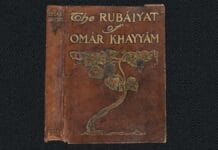Omar Khayyám’s The Rubáiyát, as translated by Edward FitzGerald, is a collection of quatrains (rubáiyát) that reflect on themes such as mortality, the transient nature of life, and the pursuit of pleasure. Verses 68-72 encapsulate Khayyám’s characteristic blend of hedonism, existential reflection, and a critique of religious and social conventions. These quatrains showcase Khayyám’s poetic mastery and philosophical depth, offering a rich tapestry of existential musings, sensual imagery, and moral critique. FitzGerald’s translation captures the elegance and subtlety of Khayyám’s reflections on life, mortality, and the human condition.
Summary
Verse 68: Ashes of Perfume
In this quatrain, Khayyám imagines that even his buried ashes will emit a fragrance so captivating that even the most devout believers will be seduced by it. This verse metaphorically suggests that his worldly pleasures and indulgences will leave a lasting impact that transcends mortality and challenges spiritual rigidity. It reflects Khayyám’s assertion of individuality and that life’s sensual pleasures have enduring value.
Verse 69: Idols and Shame
Here, Khayyám laments the consequences of his love for worldly idols, such as wine and earthly delights, which have tarnished his reputation. These pleasures, he acknowledges, have led to the loss of his honour and credibility in the eyes of others. The quatrain explores the tension between societal expectations and personal indulgences, highlighting the price paid for defying convention.
Verse 70: Repentance and Relapse
In this quatrain, Khayyám addresses the cyclical nature of repentance. He confesses to making vows of penitence, only to have them broken under the influence of intoxicating pleasures like spring and wine. The imagery of “Rose-in-hand” tearing apart his “thread-bare Penitence” underscores the ephemeral and fragile nature of his remorse, suggesting that the allure of life’s pleasures is too potent to resist.
Verse 71: The Vintner’s Paradox
This verse critiques the societal disdain for wine and indulgence while marvelling at its paradoxical value. Khayyám notes that wine has stripped him of his “Robe of Honour” (his social respectability), yet he wonders what the vintners (wine-sellers) receive in return for such a precious commodity. This reflects Khayyám’s reverence for wine as a symbol of freedom and transcendence, challenging conventional moral judgments.
Verse 72: The Fleeting Nature of Life
In this poignant quatrain, Khayyám meditates on the transience of life. The imagery of spring fading with the rose, the youth’s “manuscript“ closing, and the nightingale’s song vanishing symbolises the inevitable passage of time. The verse laments the ephemeral nature of beauty, joy, and life itself, leaving the reader with wistfulness and uncertainty about existence.
Exploration of Existential Themes
The verses delve into profound existential questions, exploring the fleeting nature of life, the consequences of indulgence, and the tension between spiritual aspirations and worldly pleasures. Verse 72 poignantly encapsulates the inevitability of time’s passage, using natural imagery (spring, rose, nightingale) to evoke the transience of beauty and joy.
Symbolism and Imagery
Khayyám employs rich symbolism, such as wine (pleasure and transcendence), roses (ephemeral beauty), and ashes (mortality and legacy), to convey complex ideas. The nightingale in verse 72 is a metaphor for the fleeting nature of life’s joys and the mystery of existence.
Tension Between Hedonism and Morality
The quatrains grapple with the moral ambiguity of indulgence. While Khayyám acknowledges the societal and personal costs of his actions (verse 69), he also celebrates the freedom and transcendence they offer (verse 71). This duality reflects a broader critique of religious orthodoxy and social conventions prioritising reputation over personal fulfilment.
Subtle Critique of Religion
Khayyám challenges religious dogma, as in verse 68, where his ashes metaphorically ensnare even the devout. This suggests that the allure of earthly pleasures transcends strict spiritual boundaries. In verse 70, his ironic reflection on repentance highlights the cyclical and often insincere nature of moral reform.
Elegance in Form and Structure
The rubáiyát form (four-line stanza with an AABA rhyme scheme) allows for concise yet impactful expressions of thought. Each verse stands alone as a complete idea while contributing to the thematic unity of the sequence. FitzGerald’s translation maintains the lyrical quality of Khayyám’s original Persian, making the verses accessible and resonant in English.
Philosophical Underpinnings
Khayyám’s verses reflect a blend of Epicurean and Sufi philosophies, advocating for the embrace of life’s pleasures while acknowledging the ultimate uncertainty of existence. The juxtaposition of hedonism with existential reflection challenges readers to confront their beliefs about life, death, and morality.
Emotional Resonance
The wistfulness of verse 72 evokes a universal sense of loss and longing, making it one of the most poignant reflections on mortality and the passage of time. Combining personal confession (verses 69-71) and universal themes creates an intimate yet expansive emotional landscape.
Verses 68-72 of The Rubáiyát exemplify Omar Khayyám’s ability to weave profound philosophical insights with evocative imagery and lyrical elegance. These quatrains challenge societal norms, question religious orthodoxy, and celebrate the beauty and brevity of life. FitzGerald’s masterful translation preserves the timeless appeal of Khayyám’s poetry, making these verses a cornerstone of existential and hedonistic literature. The themes of mortality, pleasure, and the fleeting nature of existence resonate deeply, ensuring the enduring relevance of The Rubáiyát.






























